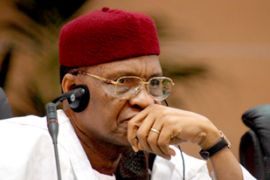Niger coup leaders face criticism
Military rulers vow early polls and pledge to transform country into “example of democracy”.

| in depth | |||||||
|
An Al Jazeera contact in Niger, who cannot be named due to security reasons, said life had returned to normal in Niamey with people resuming their daily activities.
“This morning we toured the city and found out that the military that took power have left their tanks and vehicles in some strategic points of the city,” he said.
“This is normal following a coup d’état, in order to secure these areas.”
New ruler
After carrying out the coup, soldiers calling themselves the Supreme Council for the Restoration of Democracy (CSRD), announced that Salou Djibo, their squadron leader, was the country’s new ruler.
They said in a statement that Niger’s current ministers would continue to run the government for the moment, and that they intended to turn Niger “an example of democracy and of good governance”.
| Niger at a glance | |||||||||||||
Sources: Reuters, CIA World Factbook |
The statement also said that Mamadou Tandja, the ousted president, had been seen by a doctor and the 71-year-old was “doing very well”.
Tandja is reportedly being held in an army building in Niamey.
Soldiers stormed the presidential palace on Thursday, seizing Tandja and some of his aides after a four-hour gun battle. At least three people were reported to have been killed in the gunfight.
Tensions had been high in Niger since President Tandja dissolved parliament last year and changed the constitution to extend his rule following a referendum – a move that drew widespread criticism at home and led to international sanctions.
Marie-Roger Biloa, founding editor of the Africa International magazine, said some sort of action had been expected.
“Nigeriens are very proud of their democratic process,” she told Al Jazeera from Paris, where she is based.
“They [Nigeriens] have been really trying to put a democratic institution in place, and everybody was expecting something to happen after President Tandja decided not to play by the rules.”
Last June, Tandja dissolved the constitutional court that had ruled against him and assumed the power to rule by decree, brushing aside international criticism of the move, saying he was answerable only to the people of Niger.
He was supposed to step down in December following two five-year terms in a row, but his so-called reforms removed most checks on his authority, abolished term limits and gave him an initial three more years in power without an election, an extension he said he needed to complete large-scale investment projects.

